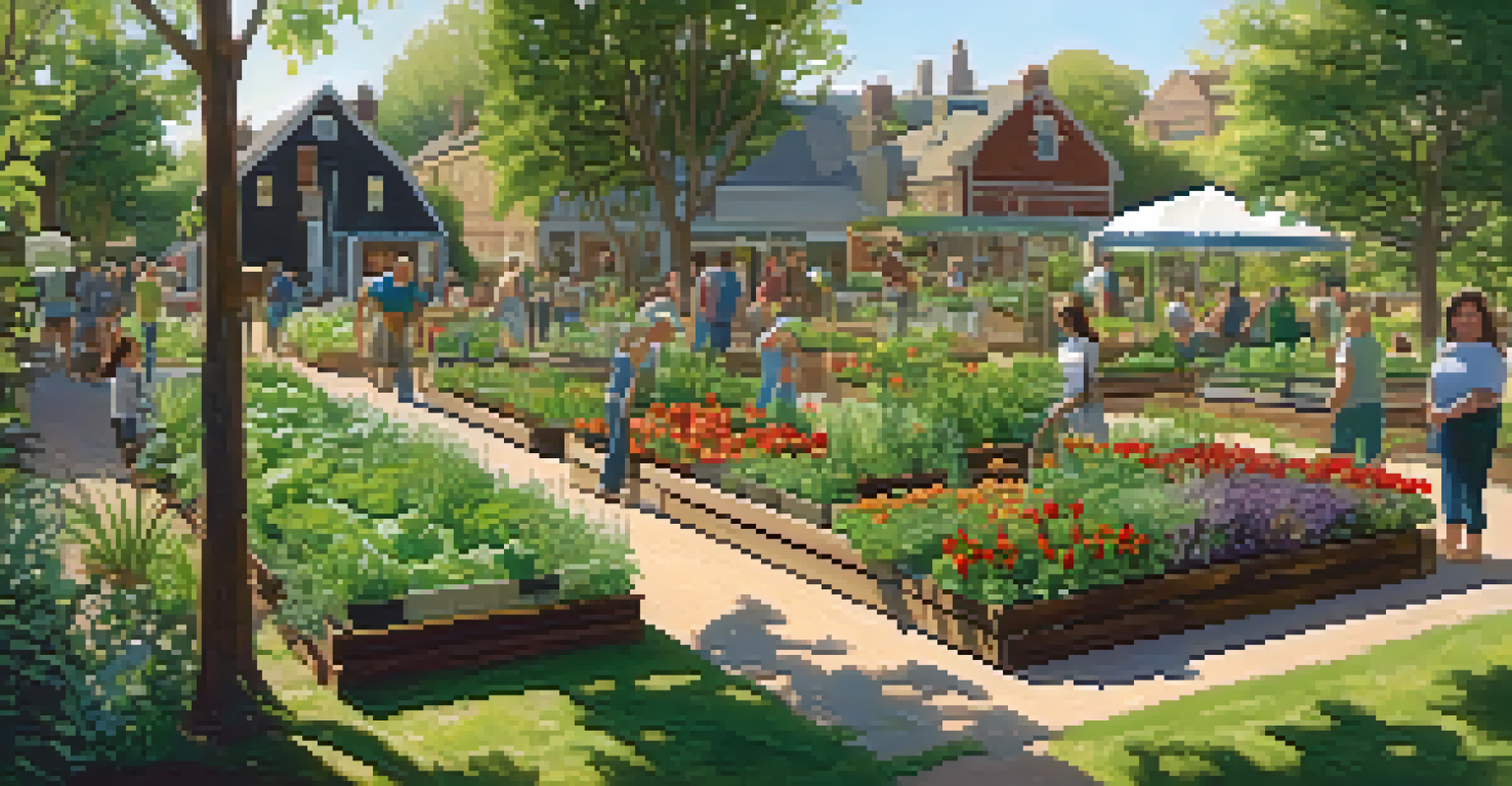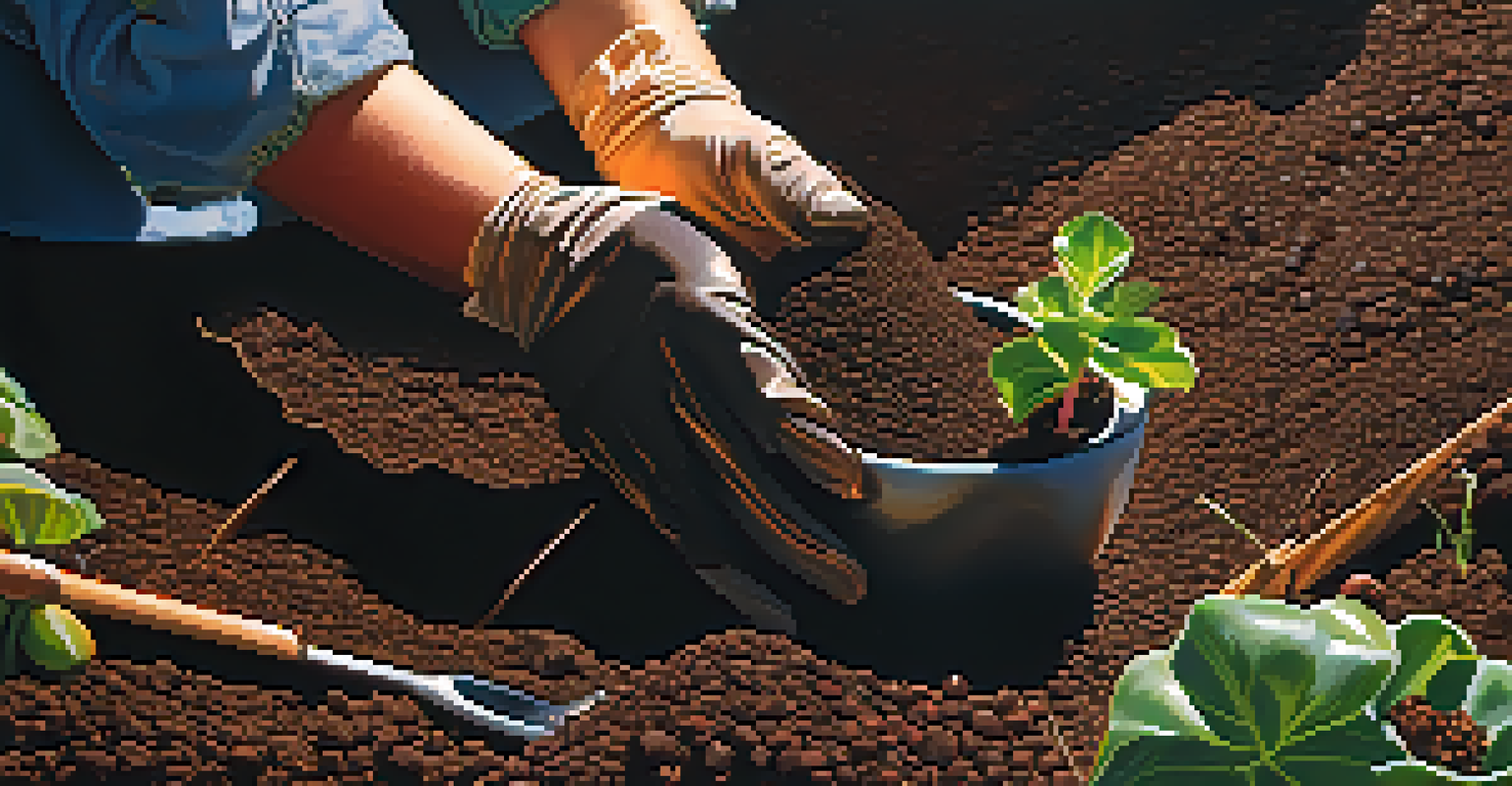Gardening as Therapy: Healing Through Plant Care

Understanding Gardening as a Form of Therapy
Gardening as therapy is an approach that uses the act of caring for plants to promote mental well-being. It’s not just about growing flowers or vegetables; it’s about nurturing life and finding solace in the process. Many people find that tending to plants can provide a sense of purpose and connection to the natural world.
Gardening adds years to your life and life to your years.
This therapeutic practice can be especially beneficial for those struggling with anxiety, depression, or stress. Engaging in gardening allows individuals to focus their thoughts and energies on something tangible, which can create a calming effect. Just like a warm cup of tea on a chilly day, the act of nurturing plants can soothe the soul.
Moreover, gardening encourages mindfulness, helping people live in the moment. As you dig your hands into the soil or prune a leaf, you become more aware of your surroundings and your feelings, creating a form of meditation that can be incredibly healing.
The Science Behind Gardening and Mental Health
Research shows that spending time in nature can significantly boost mental health. Studies indicate that gardening can lower cortisol levels, which are often linked to stress. When you’re immersed in the sights, sounds, and smells of a garden, your body responds positively, as if it’s receiving a natural antidote to anxiety.

Additionally, gardening promotes physical activity, which is another key component of mental well-being. Whether you’re digging, planting, or weeding, your body is engaging in exercise, releasing endorphins that enhance your mood. Think of it as a workout for both your body and mind, providing double the benefits.
Gardening Boosts Mental Well-Being
Engaging in gardening helps reduce stress and promotes a sense of purpose, making it a powerful tool for mental health.
Lastly, the satisfaction of watching plants grow and thrive instills a sense of achievement. This can be empowering, especially for individuals who may feel a lack of control in other areas of their lives. Every bloom and every sprout becomes a reminder of resilience and the beauty of growth.
Creating a Therapeutic Gardening Space
To leverage the therapeutic benefits of gardening, it’s essential to create a space that feels inviting and comforting. Start by choosing a location that resonates with you, whether it’s a small balcony, a backyard, or even indoor pots. Personal touches, like colorful decorations or favorite gardening tools, can enhance your connection to the space.
Gardening adds years to your life and life to your years.
Consider incorporating sensory elements into your garden. Plants with fragrant flowers, vibrant colors, and interesting textures can stimulate your senses and create a more immersive experience. Just like a favorite song can evoke memories, the right plants can transport you to a place of peace and joy.
Lastly, ensure your gardening space reflects your personality. This might mean planting your favorite flowers or designing a layout that feels harmonious. When your garden feels like an extension of yourself, it becomes a sanctuary for healing and self-discovery.
Gardening Activities That Promote Healing
Different gardening activities can offer unique therapeutic benefits. For example, planting seeds can symbolize new beginnings and hope, while weeding can provide a sense of accomplishment. These small tasks not only keep your garden healthy but also contribute to your mental wellness.
Creating a sensory garden, filled with plants that engage your senses, can be particularly rewarding. Consider incorporating herbs like lavender or mint, which not only smell delightful but can also be used in cooking. Engaging your senses can deepen your connection to the act of gardening, enhancing the therapeutic experience.
Create Your Healing Garden Space
Designing a personal and inviting gardening space can enhance your connection to nature and support emotional healing.
Another engaging activity is creating garden art, such as painted pots or decorative garden markers. This allows for creative expression, which can be incredibly fulfilling. As you paint and design, you’re not just beautifying your garden; you’re also nurturing your spirit.
Connecting with Nature: The Benefits of Outdoor Gardening
Spending time outdoors while gardening amplifies the mental health benefits. Fresh air and sunlight can uplift your mood and provide essential Vitamin D, which is crucial for overall health. Just as a walk in the park can refresh your mind, gardening outdoors allows you to recharge in nature’s embrace.
Moreover, outdoor gardening fosters a deeper connection with the environment. As you observe the changing seasons, you become attuned to the cycles of nature, which can be grounding and reassuring. This connection often brings a sense of belonging and peace in a fast-paced world.
In addition, you may find joy in sharing this experience with others. Whether gardening with friends, family, or community members, these connections can enhance your emotional well-being. The camaraderie of shared gardening efforts can create lasting bonds and support systems.
The Role of Community Gardens in Healing
Community gardens offer an incredible opportunity to experience the therapeutic benefits of gardening with others. These shared spaces can foster a sense of belonging and community, which is especially important for mental health. By working together, individuals can support one another and build friendships rooted in shared interests.
Participating in a community garden also provides access to resources and knowledge that can enhance your gardening skills. Learning from fellow gardeners, exchanging tips, and sharing successes can be both educational and uplifting. This collaborative spirit can create a vibrant environment that nourishes both plants and souls.
Community Gardens Foster Connections
Participating in community gardens builds relationships and provides a supportive environment, enriching both personal growth and mental health.
Additionally, community gardens can serve as a safe haven for individuals facing various life challenges. They can offer a supportive space for personal growth, healing, and resilience. Just as plants thrive in community, so too can individuals flourish when nurturing connections with others.
Incorporating Gardening into Daily Life for Better Mental Health
Integrating gardening into your daily routine doesn’t have to be overwhelming. Even small actions, like watering plants or spending a few moments observing your garden, can have significant mental health benefits. Think of it as a daily dose of nature therapy, providing moments of peace amidst a busy day.
You can also set aside specific times for gardening each week, treating it as a cherished appointment. Whether it’s a Sunday morning ritual or a mid-week escape, having designated time for gardening can help you establish a routine that prioritizes self-care.

Lastly, remember that gardening is a journey, not a destination. Embrace the process rather than focusing solely on the end results. Just as life has its ups and downs, so does gardening; celebrating small victories along the way can enhance your overall well-being and joy.